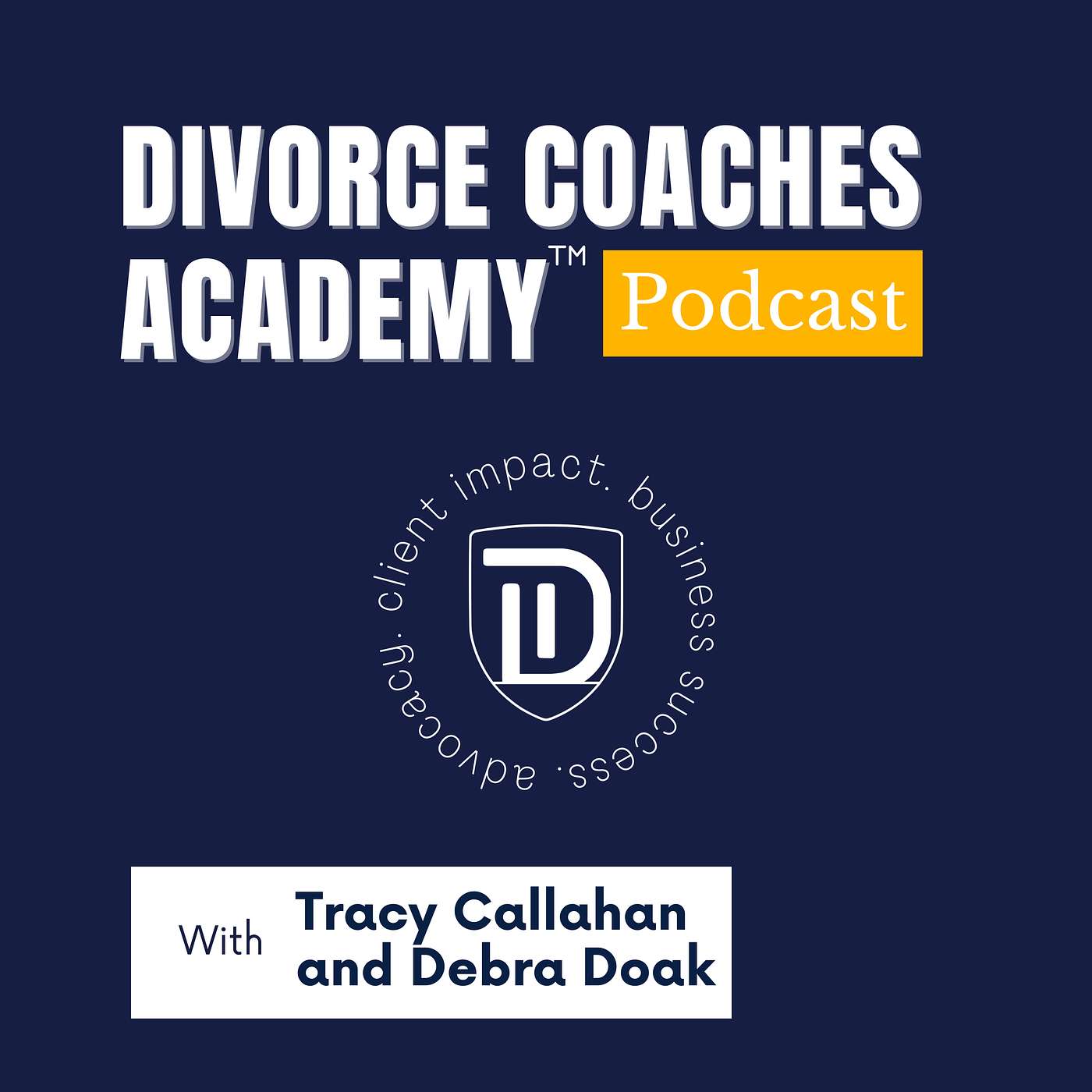Divorce Coaches Academy
When Personal Story Becomes Product: Professional Risk, Market Confusion, and the Future of Divorce Coaching
Feb 11, 2026
Season 1
Episode 197
Tracy Callahan and Debra Doak
Send Us a Message (include your contact info if you'd like a reply)
The loudest stories are getting the clicks, but are they serving clients? In this episode, we dig into a growing trend in divorce coaching—marketing that centers personal divorce and betrayal narratives—and examine how story-first positioning blurs boundaries, preloads expectations, and weakens trust with clients and referral partners.
Lived experience can spark a calling, yet without training, supervision, and clear standards of practice, narrative becomes a substitute for competence instead of context for care.
We share a colleague’s candid market signal about boundary issues on social platforms and unpack why it matters for a profession that’s maturing under increased scrutiny. From the collapse of experience and expertise to the downstream effects on decision quality, we map the operational risks when coaches promise resonance over results.
We also take a hard look at narrative-led training programs that elevate a founder’s story into “methodology,” and we explain how that shift erodes self-regulation, turns certification into symbolism, and confuses consumers who cannot see the difference between ADR-aligned coaching and scaled storytelling.
Then we offer a path forward. We outline how to right-size personal stories—context, not credential—and restore professional sequencing: my experience led me here, and my training allows me to help you. We argue for parity with family law professions where credibility rests on ethics, restraint, and competency, not disclosure.
Expect practical framing you can use today, including a simple audit question for your website and messaging: if your personal story vanished, would your professional value still be clear? The future of divorce coaching depends on discipline over drama and structure over spectacle; clarity compounds trust.
If this conversation resonates, subscribe, share with a colleague, and leave a review. Your feedback helps push the profession toward higher standards and better outcomes for clients navigating divorce.
Learn more about DCA® or any of the classes or events mentioned in this episode at the links below:
Website: www.divorcecoachesacademy.com
Instagram: @divorcecoachesacademy
LinkedIn: divorce-coaches-academy
Email: DCA@divorcecoachesacademy.com
 When Personal Story Becomes Product: Professional Risk, Market Confusion, and the Future of Divorce Coaching
20:44
When Personal Story Becomes Product: Professional Risk, Market Confusion, and the Future of Divorce Coaching
20:44
 Why Divorce Coaching Needs Clear Standards Of Practice
26:39
Why Divorce Coaching Needs Clear Standards Of Practice
26:39
 What Attorneys Wish Clients Understood About Fairness
33:55
What Attorneys Wish Clients Understood About Fairness
33:55
 Reframing Fairness Without Invalidating Emotion
32:34
Reframing Fairness Without Invalidating Emotion
32:34
 Fairness Vs. Resolution Within the ADR Framework
24:20
Fairness Vs. Resolution Within the ADR Framework
24:20
 Fair is the Four Letter Word: Why Chasing Fairness Keeps People Stuck in Divorce
21:23
Fair is the Four Letter Word: Why Chasing Fairness Keeps People Stuck in Divorce
21:23
 Diversity in Divorce Coaching: A Reflection on Access, Trust, and Effectiveness
31:57
Diversity in Divorce Coaching: A Reflection on Access, Trust, and Effectiveness
31:57
 Artificial Intelligence and Divorce Coaching: Will AI Take Our Jobs or Help Us Do Them Better?
25:29
Artificial Intelligence and Divorce Coaching: Will AI Take Our Jobs or Help Us Do Them Better?
25:29
 The Most Dangerous Sentence in Divorce
23:21
The Most Dangerous Sentence in Divorce
23:21
 Roadmap To A Sustainable ADR Divorce Coaching Practice
36:22
Roadmap To A Sustainable ADR Divorce Coaching Practice
36:22
 Reframing Conflict in Divorce Coaching: From Pathology to Pragmatism
18:59
Reframing Conflict in Divorce Coaching: From Pathology to Pragmatism
18:59
 Preparing for Divorce Month: Coaching for an Exit Strategy
40:20
Preparing for Divorce Month: Coaching for an Exit Strategy
40:20
 When Men Divorce: Exploring the Male Experience in Divorce Coaching
37:03
When Men Divorce: Exploring the Male Experience in Divorce Coaching
37:03
 Navigating Divorce When Family Advice Clashes With Resolution
30:39
Navigating Divorce When Family Advice Clashes With Resolution
30:39
 How Thoughtful Parenting Plans Reduce Conflict And Protect Kids
39:30
How Thoughtful Parenting Plans Reduce Conflict And Protect Kids
39:30
 Defining Divorce Coaching: Role, Boundaries, and Impact
25:08
Defining Divorce Coaching: Role, Boundaries, and Impact
25:08
 The Power of Mentorship: Guiding Growth in the Divorce Coaching Journey
24:34
The Power of Mentorship: Guiding Growth in the Divorce Coaching Journey
24:34
 Breaking the Cycle: How Confirmation Bias Keeps Divorcing Couples Trapped in Conflict
35:28
Breaking the Cycle: How Confirmation Bias Keeps Divorcing Couples Trapped in Conflict
35:28
 Inside New Zealand’s FDR Shake-Up: Free Mediation, Fewer Supports, and the Case for Coaching
34:20
Inside New Zealand’s FDR Shake-Up: Free Mediation, Fewer Supports, and the Case for Coaching
34:20
 Fear-Driven Divorce: Unpacking Client Anxieties
23:12
Fear-Driven Divorce: Unpacking Client Anxieties
23:12
 Brick by Brick: Divorce Lessons from the Three Little Pigs
17:59
Brick by Brick: Divorce Lessons from the Three Little Pigs
17:59
 Waiting for Sorry: Moving Beyond Apologies in Divorce
20:40
Waiting for Sorry: Moving Beyond Apologies in Divorce
20:40
 When Drinking Concerns Meet Custody: The Soberlink Solution
32:41
When Drinking Concerns Meet Custody: The Soberlink Solution
32:41
 The Unexpected Professionals Reshaping Divorce Support with Canadian Director Dori Braddell
24:25
The Unexpected Professionals Reshaping Divorce Support with Canadian Director Dori Braddell
24:25
 Who's On My Side? Helping Clients Navigate Conflicts with Their Divorce Team
24:31
Who's On My Side? Helping Clients Navigate Conflicts with Their Divorce Team
24:31
